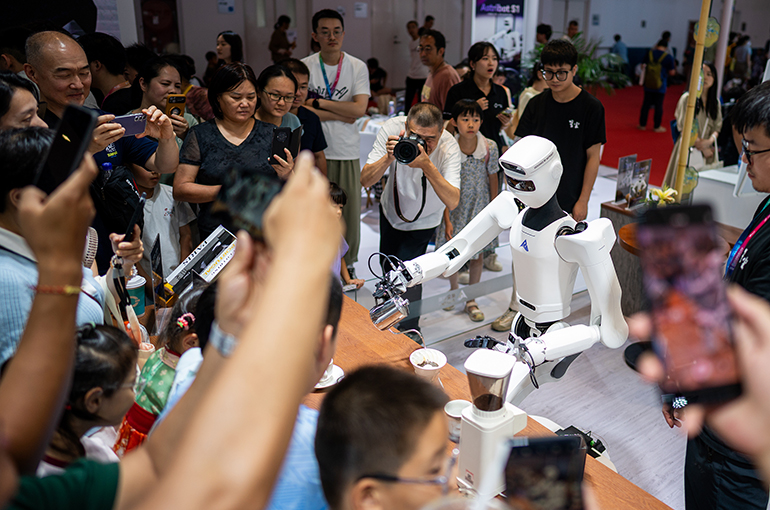 Unitree, Beijing Android Center Shine at First 'Robot Olympics'
Unitree, Beijing Android Center Shine at First 'Robot Olympics'(Yicai) Aug. 18 -- Androids developed by Chinese startup Unitree Robotics and Beijing Innovation Center of Humanoid Robots won several gold medals at the inaugural World Humanoid Robot Games, dubbed the "Humanoid Robot Olympics," in the Chinese capital city.
Unitree's robots won the 1,500-meter race, the 400-meter sprint, and the 400-meter relay at the three-day event that ended yesterday, while Tiangong Ultra, developed by the android center, won the 100-meter sprint.
During the 1,500-meter race, Unitree's H1 achieved an average speed of around 3.8 meters per second, founder and Chief Executive Wang Xingxing told Yicai after the competition. The firm used a remote controller to tap the android's full potential, he pointed out.
Tiangong Ultra uses its laser radars, cameras, and algorithms to navigate autonomously, Tang Jian, part of the developer's research and development team, said to Yicai. Like smart driving, it must find the lines on the track, but this is much more difficult because of the complex environment robots face and having to control over 30 joints, Tang added.
Several participants in the games told Yicai that they managed to improve the performance of their robots in preparations for the event.
After two to three weeks of practice, robotics startup Magiclab saw the average top speed of its robot, which qualified for the second round of the 100-meter sprint, improve by one m/s, noted R&D Chief Chen Chunyu. "We hope to use this competition to tap into the robot's best," Chen said.
However, only the robots of Unitree and PNDbotics finished the hurdles race, with the failure of the other six competitors highlighting that humanoid robots still face challenges with algorithm robustness, execution stability, and perception and motion coordination.
The games also included hotel cleaning and materials handling competitions, with teams showing the autonomous operation capabilities of their robots in complex environments. The Beijing Innovation Center's Tianyi 2.0 competed in the materials handling event and claimed the silver and bronze medals, while UniX AI's robot won the gold in the hotel cleaning contest.
Only a few of the over 20 participants in the hotel cleaning competition competed all tasks autonomously, with most having a preset list of moves made using traditional programming, said Yang Fengyu, founder and CEO of UniX AI. For example, some robots could pick up Coca-Cola cans but not Pepsi ones, according to Yang.
This exposed robots' shortcomings in the generalization of perception and environment adaptability, analysts pointed out, adding that for robots to achieve intelligence and widespread application, breakthroughs are still needed in algorithm generalization, perception ability, and adaptive learning.
Editor: Martin Kadiev